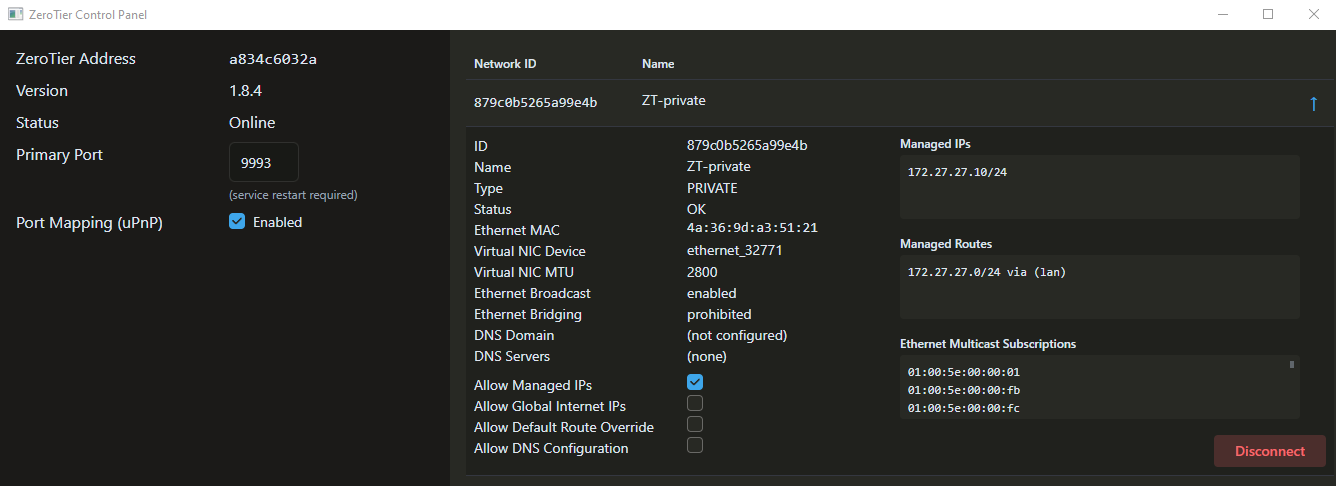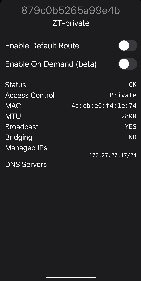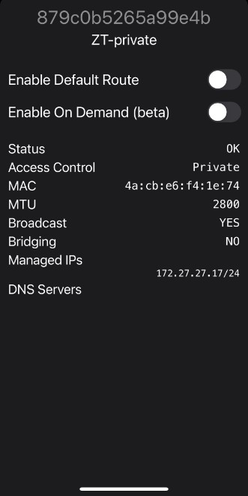...
| Note |
|---|
Also all other new hosts you have to authorize under the /zerotier/controller/member/ section. |

 Image Removed
Image Removed
Moons
All ZeroTier nodes on a planet effectively inhabit a single data center. This makes it easy to directly connect devices anywhere, but it has the disadvantage of not working without an Internet connection. A user-defined set of roots is called a moon. When a node “orbits” a moon, it adds the moon’s roots to its root server set. Nodes orbiting moons will still use planetary roots, but they’ll use the moon’s roots if they look faster or if nothing else is available.
More information you can find here, but further in this article, we will take a more detailed overview of very basic operations with moons in RouterOS.
Generate a moon
In the following example with the update-moon-json configuration command we generate a .json type file and its corresponding .moon file:
| Code Block |
|---|
|
[admin@office] /zerotier> update-moon-json identity=zt1 address=172.17.17.15
[admin@office] /zerotier> /file pr
Columns: NAME, TYPE, SIZE, CREATION-TIME
# NAME TYPE SIZE CREATION-TIME
0 000000879c0b5265.moon .moon file 259 jan/12/2022 16:10:06
1 000000879c0b5265.moon.json .json file 757 jan/12/2022 16:10:06
2 flash disk jan/12/2022 16:08:20
3 flash/skins directory jan/12/2022 02:00:20 |
The .json will contain something like:
| Code Block |
|---|
{
"id": "879c0b5265",
"objtype": "world",
"roots": [
{
"identity": "879c0b5265:0:d5fd2d17805e011d9b93ce8779385e427c8f405e520eea9284809d8444de0335a817xxb21aa4ba153bfbc229ca34d94e08de96d925a4aaa19b252da546693a28",
"stableEndpoints": [
"172.17.17.15"
]
}
],
"signingKey": "ed0cc50bda211da1fdb383629164f5411e74f954b8bb9db58369cb0749c3575a141a04b82ab0350e38f325fac5f87671ed1d7f171c5a7e9a238b097643a3612a",
"signingKey_SECRET": "f7963c501d8c254c8719ae9d1d6f9f442612aa888b63d668d1a78296a9b3463b09736014be27f561e85de3d4beaf57d3d3a859773110a5885d3fda9947062927",
"updatesMustBeSignedBy": "ed0cc50bda211da1fdb383629164f5411e74f954b8bb9db58369cb0794c3411a575a04b82ab0350e38f325fac5f87671ed1d7f171c5a7e9a238b097643a3612a",
"worldType": "moon"
} |
Add moon
If you configure update-moon-json with moon-json and existing .json file:
| Code Block |
|---|
|
[admin@Home] /zerotier> update-moon-json moon-json=000000879c0b5265.moon.json address=172.17.17.13 identity="deb55dc5b1:0:705c7afebc91bbed3ef81a754b0be4256c9edac702d2c7befd7da8f9c4ec2850a95fd3a863a4249f81c57a91ed784ab145bb915cf4b67abda2665e8775565307" |
First, we notice that the file size increases from 757 to 974:
| Code Block |
|---|
|
[admin@Home] /zerotier> /file print
Columns: NAME, TYPE, SIZE, CREATION-TIME
# NAME TYPE SIZE CREATION-TIME
0 000000879c0b5265.moon .moon file 338 jan/12/2022 16:30:56
1 000000879c0b5265.moon.json .json file 974 jan/12/2022 16:30:56
2 flash disk jan/12/2022 16:08:20
3 flash/skins directory jan/12/2022 02:00:20 |
By opening the updated .json file we can find an additional root:
| Code Block |
|---|
{
"id": "879c0b5265",
"objtype": "world",
"roots": [
{
"identity": "879c0b5265:0:d5fd2d17805e011d9b93ce8779385e427c8f405e520eea9284809d8444de0335a817ccb21aa4ba153bfbc229ca34d94e08de96d925a4aaa19b252da546693a28",
"stableEndpoints": [
"172.17.17.15"
]
},
{
"identity": "deb55dc5b1:0:705c7fmarc91bbed3ef81a754b0be4256c9edac702d2c7befd7da8f9c4ec2850a95fd3a863a4249f81c57a91ed784ab145bb915cf4b67abda2665e8775565307",
"stableEndpoints": [
"172.17.17.13"
]
}
],
"signingKey": "ed0cc50bda211da1fdb383629164f5411e74f954b8bb9db58369cb0749c3575a141a04b82ab0350e38f325fac5f87671ed1d7f171c5a7e9a238b097643a3612a",
"signingKey_SECRET": "f7963c501d8c254c8719ae9d1d6f9f442612aa888b63d668d1a78296a9b3463b09736014be27f561e85de3d4beaf57d3d3a859773110a5885d3fda9947062927",
"updatesMustBeSignedBy": "ed0cc50bda211da1fdb383629164f5411e74f954b8bb9db58369cb0794c3411a575a04b82ab0350e38f325fac5f87671ed1d7f171c5a7e9a238b097643a3612a",
"worldType": "moon"
} |
Export moon
As the self-explained export-moon command indicates, you can export the moon from the working ZeroTier instance:
| Code Block |
|---|
|
[admin@office] > zerotier/export-moon zt1 moon=000000deb55dc5b1
[admin@office] > file pr where name~"moon"
Columns: NAME, TYPE, SIZE, CREATION-TIME
# NAME TYPE SIZE CREATION-TIME
0 000000879c0b5265.moon .moon file 259 jan/12/2022 16:18:10 |
Import moon
To import a moon you have to select an instance and the moon file for import, in the following example we will import the moon from "RouterOS Office" to the "RouterOS Home" device:
| Code Block |
|---|
|
[admin@Home] /zerotier> peer/pr
Columns: INSTANCE, ZT-ADDRESS, LATENCY, ROLE, PATH
4 zt1 deb55dc5b1 29ms LEAF active,preferred,159.148.172.243/9993,recvd:3s962ms,sent:3s962ms
[admin@Home] /zerotier> import-moon moon=000000deb55dc5b1.moon zt1
[admin@Home] /zerotier> peer/pr
Columns: INSTANCE, ZT-ADDRESS, LATENCY, ROLE, PATH
4 zt1 deb55dc5b1 MOON |
Drop moon
To remove the moon from the instance, use the drop-moon command as follows:
| Code Block |
|---|
|
[admin@office] > /zerotier> drop-moon moon=000000deb55dc5b1 zt1 |
Orbit moon
The orbit-moon feature allows you to fetch moon configurations from the moon itself with a pointing IP address:
...
...
 Image Added
Image Added


